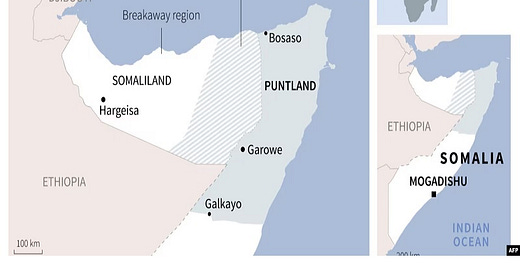Mogadishu is pressured to react in a way that exerts the federal government’s writ over Puntland such as requesting its allies in Ankara to patrol its coast per their mid-February maritime security deal, yet President Erdogan might not want to get embroiled in a foreign political dispute so soon after Sunday’s disastrous elections, but doing nothing would undermine his and his Somalian counterpart’s reputations.
The Somalian state of Puntland declared on Sunday that it’s withdrawn from Somalia’s federal system in protest of constitutional changes that’ll lead to a one-person, one-vote system and empower the president to appoint the prime minister without parliamentary approval. Somalia had hitherto employed what Garowe Online described as a “traditional model where elders pick legislators who in turn elect the president”, but that person will now be directly elected by the people, among other political changes.
Puntland has enjoyed wide autonomy for a while, but unlike neighboring Somaliland, it never had any prior history of independence to redeclare and hasn’t sought to unilaterally declare independence either. This state also used to be a hotspot of piracy, which is once again making a comeback, and importantly abuts the Gulf of Aden/Berbera. Its withdrawal from the federal system therefore cuts the rest of the country off from that crucial body of water and thus reduces its geostrategic significance.
This poses a dilemma for Mogadishu since President Hassan Sheikh Mohamud (HSM) has presented himself as a unifier in the face of Somaliland’s Memorandum of Understanding with Ethiopia over military-commercial port access in exchange for stakes in at least one national company and recognition. His very sharp rhetoric on that issue was followed by trips to Eritrea and Egypt, who he was suspected of trying to solicit for reconquering Somaliland, yet he’s thus far playing it cool with Puntland.
On the one hand, overreacting to this symbolic form of political protest that essentially formalizes the status quo of Puntland’s wide autonomy risks pushing this state in the direction of independence, but not really doing anything risks making himself look weak and undermining his recent unifier rhetoric. This dilemma takes on international dimensions when remembering that his federal government agreed to a maritime security pact with Turkiye in mid-February for protecting the country’s coasts.
Since Puntland is recognized by Ankara as part of Somalia, HSM could request that his allies implement their part of the deal as a symbolic show of federal authority over that state, but there’s a chance that Ankara might decline and thus undermine his unifier image with potentially disastrous political results. Therein lies the other dilemma posed by Puntland’s declaration since it also puts Turkiye in a pinch too seeing as how it’s legally obligated to abide by such a request if Mogadishu decides to make it.
On the one hand, declining to do so would wisely avoid embroiling Turkiye in a foreign political dispute that President Recep Tayyip Erdogan would prefer to not deal with so shortly after the ruling party received its worst electoral trouncing in decades following Sunday’s nationwide municipal election. On the other hand, however, failing to implement its international legal obligation to Somalia could undermine trust in Turkiye as a partner and potentially unravel its hard-earned reputation in Africa.
Puntland might of course grandfather in mid-February’s maritime security deal with Turkiye and therefore avoid the international dimensions of these two aforesaid dilemmas. That would be the best-case scenario for every concerned party, but rarely do three parties – one of whom is a foreign party – end up doing what’s best for all their interests amidst a sensitive political dispute. It therefore remains to be seen what’ll happen, but Mogadishu and Ankara surely aren’t pleased with Puntland’s move.




